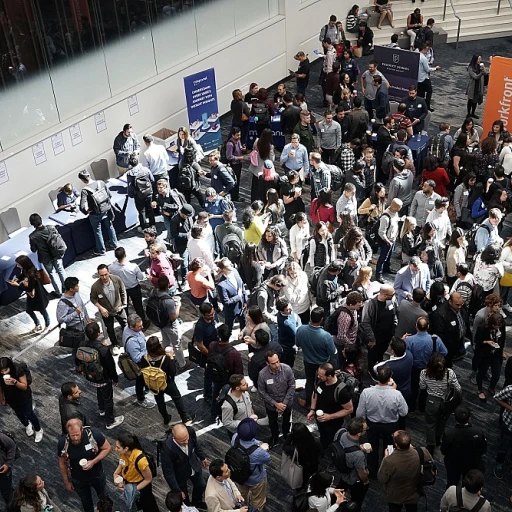
Understanding the intersection of AI and human resources
The evolving landscape of human resources and artificial intelligence
Artificial intelligence is rapidly changing the way organizations approach human resources. The integration of AI into HR processes is not just about automation, but about enhancing the entire organizational development journey. From recruitment to leadership development, AI is helping organizations become more agile and responsive to change. This shift is especially relevant for adult learners, students, and professionals pursuing studies in human resource management, organizational leadership, and related fields. As businesses adapt, the focus is on leveraging technology to support both human and organizational growth.
Key areas where AI intersects with HR
- Talent management: AI-driven tools are transforming how organizations identify, attract, and retain talent. These tools help streamline the recruitment process, making it easier for HR professionals to match candidates with the right roles and programs.
- Learning and development: AI supports personalized learning paths, allowing employees and adult learners to access tailored courses and development programs. This is crucial for those enrolled in organizational development or human resource degree programs, as well as for professionals seeking to enhance their leadership skills.
- Organizational change: AI can analyze organizational data to identify trends and recommend strategies for effective change management. This is particularly valuable for organizations undergoing transformation or implementing new business processes.
Why understanding AI in HR matters
For students, adult learners, and professionals in the fields of human resources, organizational development, and leadership, understanding the intersection of AI and HR is essential. Whether you are taking a course video, participating in a project management program, or working towards a major in human organizational studies, AI is becoming a core part of the curriculum and the workplace. The ability to navigate AI-driven tools and processes is now a critical skill for those aiming to lead organizational change and drive business success.
For a deeper look at how AI is shaping competency frameworks and performance in HR, explore this comprehensive competency checklist for medical assistants, which highlights the practical impact of AI on workforce development.
Enhancing talent acquisition and recruitment
Transforming Recruitment with AI-Driven Insights
AI is reshaping how organizations approach talent acquisition and recruitment. By leveraging advanced algorithms, human resource teams can analyze vast amounts of candidate data, streamlining the process and making it more efficient. This shift is not just about speed; it’s about enhancing the quality of hires and aligning them with organizational development goals.
- Data-Driven Candidate Screening: AI tools can assess resumes and applications, identifying skills and experiences that match the requirements of the business. This supports human resource management in making informed decisions and reduces unconscious bias in the process.
- Predictive Analytics for Better Matches: By analyzing historical hiring data, AI can predict which candidates are likely to succeed in specific roles. This is particularly valuable for leadership development and project management positions, where the right fit is crucial for organizational success.
- Automated Communication: Chatbots and virtual assistants can handle initial candidate queries, schedule interviews, and provide updates. This improves the candidate experience and allows human resources professionals to focus on more strategic tasks.
For students and adult learners pursuing a degree in human organizational development or related studies, understanding these AI-driven changes is essential. Many programs now include course video content and play course modules on AI in recruitment, preparing students for the evolving landscape. Courses often cover topics like resource management, organizational leadership, and the integration of AI into the recruitment process. These are typically offered in both fall semester and spring semester, with credit hours and term hours designed to fit the needs of adult learners.
Organizations that embrace AI in recruitment are better positioned to adapt to change and support ongoing human development. As the field continues to evolve, staying informed about best practices and new technologies is key for anyone involved in human resources, education, or organizational development. For a deeper look at how AI is enhancing leadership in human resources, explore this resource on AI-driven leadership development.
Personalizing employee learning and development
AI-driven pathways for employee growth
Artificial intelligence is reshaping how organizations approach learning and development. By leveraging AI, human resource teams can offer tailored learning experiences that adapt to the unique needs of each employee, whether they are adult learners, recent graduates, or experienced professionals. This personalized approach supports organizational development and helps align individual growth with business goals.
AI-powered platforms analyze data from various sources—such as performance reviews, project management tools, and course video engagement—to recommend relevant programs and courses. These recommendations can be based on an employee’s current role, career aspirations, or even the organization’s leadership development objectives. For example, a major in organizational leadership or a degree in human resource management can be complemented by targeted online courses, ensuring that both students and professionals continuously develop their skills.
- Adaptive learning systems adjust content in real time, making it easier for adult learners to progress at their own pace during a fall semester or spring semester.
- AI can identify skill gaps and suggest specific credit hours or term hours needed to complete a program or course, streamlining the education process for both students and employees.
- Organizations benefit from data-driven insights, allowing management to track the effectiveness of learning initiatives and adjust programs as needed for maximum impact.
Integrating AI into learning and development also supports the broader goals of human and organizational development. It enables organizations to foster a culture of continuous improvement, ensuring that employees are equipped to handle change and contribute to organizational success. Whether through leadership development, project management training, or specialized studies in human development, AI helps create a more agile and skilled workforce.
For those looking to enhance onboarding experiences, AI can also play a role in making new hires feel welcomed and supported. Discover more about AI-powered onboarding solutions that can further personalize the employee journey.
Improving employee engagement and retention
AI-driven strategies for boosting employee satisfaction
Artificial intelligence is transforming how organizations approach employee engagement and retention. By leveraging advanced analytics and machine learning, human resource management teams can better understand what motivates employees and identify early signs of disengagement. This proactive approach supports organizational development and helps create a more positive work environment for both adult learners and traditional employees. AI tools can analyze feedback from employee surveys, performance reviews, and even course video participation in leadership development programs. These insights allow management to tailor programs and initiatives that address specific needs, whether it's flexible work arrangements, new learning opportunities, or recognition programs. For example, organizations can use AI to recommend personalized development adlt courses or suggest project management training based on an individual's career goals and past performance.- AI-powered chatbots provide instant support for HR-related queries, improving the employee experience and freeing up time for human resource professionals to focus on strategic initiatives.
- Predictive analytics help identify employees at risk of leaving, enabling timely interventions such as mentorship programs or new organizational leadership opportunities.
- Automated feedback systems ensure continuous communication between management and staff, supporting ongoing organizational change and growth.
Supporting diverse learning and development needs
Modern organizations recognize that adult learners and students have different needs when it comes to professional growth. AI enables the creation of customized learning paths, aligning with individual goals and the broader objectives of the organization. For instance, AI can recommend relevant courses for those pursuing a degree in human organizational development or suggest leadership development programs for those interested in organizational leadership. The flexibility offered by AI-driven platforms allows employees to engage with content at their own pace, whether during the fall semester, spring semester, or throughout the year. This approach not only enhances the learning process but also supports retention by making education more accessible and relevant. Credit hours and term hours can be tracked automatically, ensuring that employees and students will meet their program requirements efficiently.Building a culture of continuous improvement
Retention is closely linked to a culture that values ongoing education and organizational development. AI supports this by streamlining the management of business programs, tracking progress in organization development courses, and providing actionable insights for leadership development. With AI, organizations can more effectively manage change, adapt to new challenges, and foster an environment where both human and organizational growth are prioritized. Ultimately, integrating AI into human resource and organizational development processes empowers organizations to better support their people, leading to higher engagement, lower turnover, and a stronger foundation for future success.Addressing ethical challenges and data privacy
Balancing Innovation with Responsibility
Artificial intelligence is transforming how organizations approach human resource management, but it also brings new ethical challenges. As AI becomes more integrated into organizational development, leaders and students in business and human resource programs must understand the implications for data privacy, transparency, and fairness.Key Ethical Considerations in AI-Driven HR
- Data Privacy: AI systems process large volumes of employee data to support learning, leadership development, and resource management. Organizations must ensure compliance with privacy regulations and establish clear policies for data collection, storage, and use. Adult learners and students will benefit from understanding these processes in their studies and future roles.
- Bias and Fairness: AI algorithms can unintentionally reinforce existing biases in recruitment, performance management, and organizational development. Regular audits and transparent program design help minimize these risks, supporting a fair process for all employees and candidates.
- Transparency: Employees and management should be informed about how AI tools are used in decision-making. Open communication builds trust and encourages engagement with new technologies, especially during change initiatives or leadership development programs.
- Accountability: Organizations must define clear responsibilities for managing AI systems. This is essential in project management, human resource courses, and organizational leadership programs, where students learn the importance of ethical leadership and accountability in business decisions.
Building Trust in AI-Driven HR Practices
For organizations and adult learners in education or degree programs, fostering a culture of trust is crucial. This involves:- Providing regular training on ethical AI use for human resources and management teams
- Including ethics modules in organizational development and leadership courses
- Encouraging feedback from employees about their experiences with AI-driven processes
- Reviewing and updating policies each semester as technology and regulations evolve
Preparing for the future of human and organizational development
Building Future-Ready Organizations with AI
Organizations are increasingly integrating artificial intelligence into their human resource management strategies. This shift is not just about technology adoption, but about preparing the workforce for ongoing change. As AI continues to influence business processes, human and organizational development must adapt to ensure both employees and leaders are equipped for the future.Key Strategies for Sustainable Growth
- Continuous Learning: Organizations should offer ongoing education programs, including course video content and project management workshops, to help adult learners and students stay updated with AI trends. Programs can be structured around fall semester and spring semester schedules, making it easier for those balancing work and studies.
- Leadership Development: Investing in organizational leadership and leadership development courses ensures that future managers are ready to guide teams through technological changes. These programs often include credit hours and term hours, supporting both degree-seeking students and professionals in development adlt tracks.
- Change Management: Effective change management is essential for a smooth transition. Human resource teams can design organization development initiatives that support employees during AI-driven transformations, focusing on both human development and organizational needs.
- Personalized Learning Paths: AI can help tailor learning experiences to individual needs, making it easier for adult learners and students to progress at their own pace. This approach supports both business objectives and personal growth.













